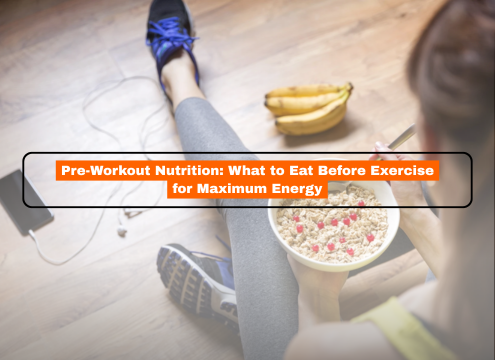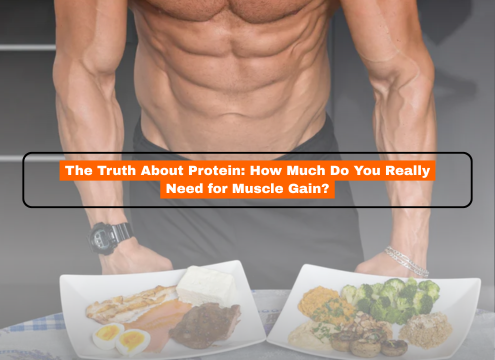Fueling your body before a workout is just as important as the workout itself. You wouldn’t start a road trip on an empty tank—so why would you expect your body to perform at its best without proper fuel?
Whether you’re hitting the gym, running outdoors, doing a yoga session, or strength training, your pre-workout nutrition can make or break your performance. The right foods give you energy, support muscle function, and help prevent fatigue, dizziness, or injury during exercise.
Let’s explore why pre-workout nutrition matters, what to eat (and what to avoid), when to eat it, and how to customize it to your lifestyle and fitness goals.
Why Pre-Workout Nutrition Matters
When you exercise, your muscles need energy to function efficiently. This energy comes from the food you eat. If your body doesn’t have enough fuel before a workout, it might break down muscle tissue for energy, leading to muscle loss rather than muscle gain. Plus, low blood sugar can leave you feeling tired, dizzy, and weak during your workout.
Here’s what proper pre-workout nutrition does:
- Boosts energy levels and endurance
- Enhances focus and coordination
- Prevents muscle breakdown
- Supports better performance and recovery
- Reduces the risk of injury and fatigue
When Should You Eat Before a Workout?
Timing matters. The ideal window for a pre-workout meal or snack is 30 to 60 minutes before exercise. This gives your body time to digest the food and convert it into usable energy without feeling heavy or sluggish.
Aim to eat a larger meal, such as breakfast or lunch, two to three hours prior to working out. You can have a lighter snack 30 to 45 minutes before.
General guideline:
- 2–3 hours before workout: Full balanced meal
- Eat a light, high-carb snack with a small amount of protein 30 to 60 minutes before working out.
What to Eat Before a Workout
1. Complex Carbohydrates = Steady Energy
Carbs are the body’s primary energy source during exercise. When you eat complex carbs, they break down slowly and provide a steady release of glucose, keeping you energized throughout your workout.
Great pre-workout carbs:
- Oats: Slow-digesting carbs with a touch of protein and fiber.
- Sweet potatoes: Packed with vitamins and clean-burning energy.
- Bananas: Quick carbs + potassium = perfect fast fuel.
- For long-lasting energy, serve whole grain toast with a spread.
- Dates or dried figs: Quick-release energy for shorter workouts.
2. Lean Protein = Muscle Support
Protein before your workout provides the building blocks your muscles need, especially if you’re doing strength or resistance training. It promotes healing, improves muscle regeneration, and lessens muscular breakdown.
Top pre-workout protein choices:
- Boiled eggs
- Greek yogurt or curd (plain)
- Low-fat paneer
- Nut butters (like almond butter, if tolerated)
- Protein smoothie or shake
- Tofu or tempeh (if you have 2+ hours before working out)
3. Healthy Fats? Only in Moderation
Fats digest slowly and can cause discomfort if eaten right before intense workouts. But in small amounts, healthy fats are useful if you’re doing longer, low-intensity workouts (like a hike or yoga session).
Use sparingly:
- Chia seeds
- Flaxseeds
- Avocado
- Nuts and nut butters
Avoid heavy or greasy meals before workouts.
4. Hydration = Better Strength and Focus
Water is often overlooked, but it plays a huge role in your performance. Even slight dehydration can impair strength, coordination, and endurance.
Hydration tips:
- Drink 1–2 glasses of water 30–60 minutes before your workout.
- Drink water throughout your session, particularly if it lasts more than half an hour.
- If you sweat a lot or work out in heat, consider coconut water or an electrolyte mix.
What to Avoid Before a Workout
Energy dumps, cramping, nausea, and discomfort might result from eating the wrong meals right before going out. Here’s what you should skip:
❌ High-fat or greasy foods
They digest slowly and can sit heavy in your stomach.
Examples:
- Fried snacks
- Cheese-loaded sandwiches
- Heavy curries or gravies
❌ High sugar snacks
Candies, soda, and pastries spike your blood sugar—then crash it mid-workout.
❌ Carbonated drinks
Can cause bloating, burping, and discomfort during movement.
❌ Too much fiber
While fiber is great, eating a lot right before your workout can lead to gas or bloating.
Pre-Workout Nutrition by Workout Type
Different workouts place different demands on the body. Here’s how to tailor your pre-workout fuel:
🏃 Cardio (Running, Cycling, Zumba)
- Prioritize quick carbs (banana, toast with jam, date).
- Small protein is optional unless it’s a long session.
🏋️♂️ Strength Training (Weights, HIIT)
- Combine carbs + protein for optimal muscle performance and repair.
- E.g., oats + Greek yogurt, protein smoothie + fruit.
🧘 Yoga or Light Exercise
- Light meal with balanced carbs and protein, low in fat.
- Hydration is key; avoid bloating foods.
🕗 Early Morning Workouts
- No time to eat? Grab a banana, date, or a small smoothie to give your body something to run on.
- Even 100–150 kcal is better than nothing.
Sample Pre-Workout Snack Ideas (30–60 mins before)
| Option | Ingredients | Benefits |
| Banana + 5 almonds | Quick carbs + healthy fats | Quick energy + satiety |
| Greek yogurt + honey + berries | Protein + natural sugars | Muscle support + energy |
| Whole grain toast + peanut butter (if tolerated) | Carbs + protein + fat | Balanced fuel |
| Oats with banana slices | Fiber + carbs | Sustained energy |
| Homemade smoothie (banana + protein powder + milk) | Carbs + protein | Quick and effective |
| Boiled egg + 1 slice of toast | Protein + carbs | Simple and powerful |
Myths About Pre-Workout Eating
Myth: “Working out on an empty stomach burns more fat.”
Truth: Fasted workouts may slightly increase fat use for fuel, but they can also lead to muscle loss, low energy, and poor performance. Especially for strength training, you need fuel.
Myth: “I should only eat protein before a workout.”
Truth: Carbs are just as important—if not more. You need carbs and protein to perform well and protect your muscles.
Myth: “Coffee is enough.”
Truth: While caffeine can give a temporary boost, it doesn’t replace food. Always combine caffeine with a small carb-rich snack.
What If You’re Not Hungry Before a Workout?
That’s common—especially with early morning workouts. Try:
- A half banana
- 1 date
- 100 ml smoothie
- A bite of toast with nut butter
You only need little amounts of easily digested carbohydrates to get the boost you need without feeling stuffed.
Personalizing Your Pre-Workout Routine
There’s no one-size-fits-all. Your ideal pre-workout meal depends on:
- Workout type and intensity
- Duration of the session
- Your body weight and metabolism
- Time of day
- Digestive comfort
Experiment with different foods and timing to find what works best for you. Keep track of your energy levels, recuperation, and how you feel so you can make adjustments.
Conclusion: Train Strong by Fueling Smart
Think of pre-workout nutrition as your secret weapon. It doesn’t have to be fancy—just functional. By eating the right foods at the right time, you’ll feel more energized, reduce your risk of injury, and improve your overall fitness progress.
So next time you lace up your shoes or grab your yoga mat, remember: you can’t run on empty. Give your body the fuel it needs—and it’ll reward you with strength, stamina, and success.
Fuel smart. Train strong. Perform better.





